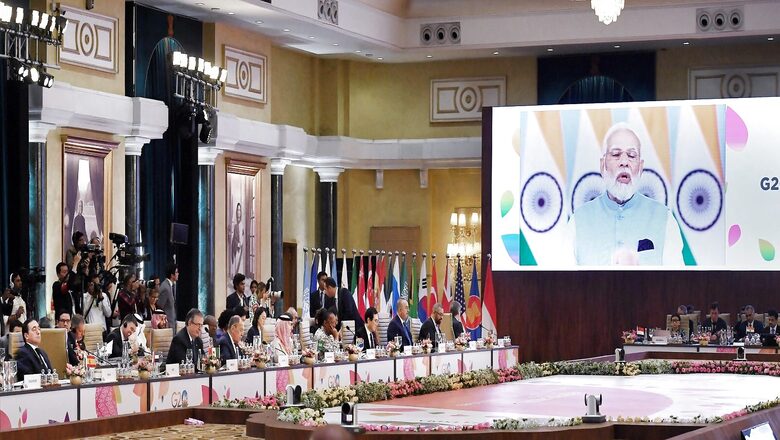
views
This year is going to be a key one for India due to the sheer number of diplomatic events that it is hosting. Among them, the G20 summit scheduled to be held in September 2023 is going to be a major opportunity for India to secure its credentials as a rising power of consequence. However, India has already started signalling the same if we go by the events of this week.
India hosted the second high-level ministerial meet in New Delhi, the G20 foreign ministers’ meet, on the 1st and 2nd of this month. Although the meet ended on a sober note with no joint statement released due to lack of a consensus between the participating countries on the Ukraine-Russia conflict. India was still able to use the opportunity to showcase its growing influence across the world. If we leave aside the chasm between the West and Russia-China over a joint communique, India was able to achieve consensus on almost every other issue, including climate action, biodiversity, gender issues, new emerging technologies, etc.
Another big achievement for India is the unequivocal condemnation of terrorism in all forms that it was able to secure from the participants at the foreign ministers’ meet. This was the first time that a G20 foreign ministers’ meeting saw participation from such a large number of countries.
G20 was formed during the Asian financial crisis as a forum to discuss pressing global economic and financial issues to secure cooperation among developed and developing countries. In 2008, the practice of an annual summit-level meet was institutionalised. While the origin of this organisation was rooted in a financial crisis, this year also the world is battling multiple challenges including the Ukraine-Russia conflict, impact of the Covid pandemic and fragile supply chains among others as pointed out by the Minister of External Affairs, Dr S Jaishankar today. India is best placed to spearhead the G20 agenda this year due to its status as a developing country which has maintained its status as the fastest-growing major economy for a long time now. Among the global debt crisis and economic woes, India also continues to be a resilient bright spot with GDP projected to clock a 7% growth rate.
Interestingly, the foreign ministers’ meet led to the first visit by Chinese foreign minister Qin Gang to India after he replaced Wang Yi. The last foreign minister to visit India was Wang Yi in March 2022. Wang Yi was given a cold reception at that time over LAC incursions by China with no official announcement of his visit despite requests placed by China to do the same. He was also denied an audience with Prime Minister Narendra Modi.
However, India had kept the communication line open between foreign ministers as EAM Jaishankar had met on the sidelines of the SCO summit in 2020 and 2021 and the G20 foreign ministers’ meet in 2022. While EAM Jaishankar met his Chinese counterpart Qin Gang today as well on the sidelines of G20 FMM 2023, he mentioned to him explicitly that the relations between the two countries are still abnormal. The discussion between them was dominated by bilateral issues and focussed majorly on peace and tranquillity at the border.
The fact that India has linked its overall relationship with China with peace on the border reflects its growing cognisance of the threat that China poses to India’s rising power. Unlike other major powers such as Russia and the United States that have welcomed India’s aspirations as a leading power, China continues to obstruct India’s rise and is deliberately using the transgressions at LAC to keep India in jitters. However, an undeterred India is seeking external support to balance China. The foreign ministers’ meet (FMM) will be followed by a Quad meet with foreign ministers from the US, Japan, Australia and India. This may not go down with the Russians and Chinese, especially in absence of a Russia-India-China trilateral. But the plan of Quad countries to jointly address an hour-long public event at the Raisina Dialogue would be good for optics where they will reportedly lay out tangible achievements of the grouping.
India may be battling many challenges of its own and that definitely includes an unequal trade relationship that it shares with China, but that’s not stopping it from seeking a greater role globally. Prime Minister Narendra Modi’s statement at the FMM on Thursday is a case in point where he said that multilateralism is in a state of crisis today because of its failure to prevent future wars and foster international cooperation on many issues. India has been long advocating for a reform of the current system of global governance, especially of the institutions such as the UN Security Council that don’t reflect the realities of the global order anymore.
Interestingly, India found support on this matter from Russia with whom it shares the vision of a multipolar world. Minister Sergey Lavrov not only called for a reform of the UN Security Council which has been pending for a long time but he also lauded India’s responsible behaviour at the global level.
The author is a PhD in International Relations from the Department of International Relations, South Asian University. Her research focuses on political economy of South Asia and regional integration. Views expressed are personal.
Read all the Latest Opinions here




















Comments
0 comment